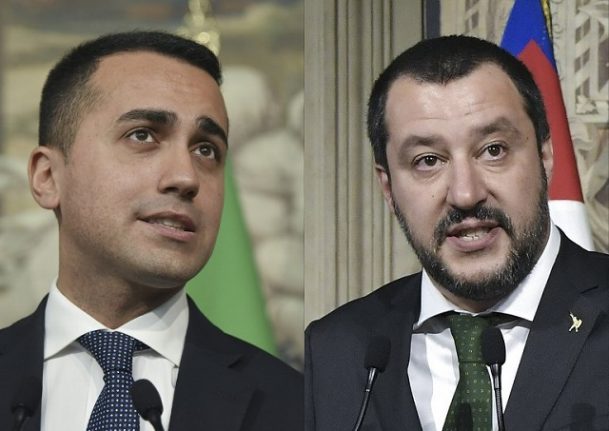On Italy's debt
Italy is battling a public debt of €2.3 trillion, 132 percent of gross domestic product (GDP) – the second highest ratio in the EU behind Greece. The M5S-League coalition promises to stimulate the economy through more spending.
“The government's actions will target a programme of public debt reduction not through revenue based on taxes and austerity, policies that have not achieved their goal, but rather through increased GDP by the revival of internal demand,” the document says.
Just four sentences of the document dealt with the public debt and deficit.
On the EU
The eurosceptic coalition promises a series of measures to reign in the EU including renegotiation of EU treaties and a review of the bloc's economic governance on issues such as the single currency.
On tax and 'basic income'
The League has inserted its flat tax policy into the programme, adding a 20 percent rate to the 15 percent proposed before the election. Also included is Five Star's flagship basic income plan, which sees €780 a month paid to those with no revenue, while those earning less than the basic will see their income topped up. It will be revoked from anyone who refuses three job offers within two years.
On immigration
The parties pledge to stop “the business” of migration, cracking down on smuggling networks and cooperatives that manage asylum centres. They also want to speed up expulsions of illegal immigrants.
They demand Italy have “a decisive role” in European negotiations on migration and want to accelerate the examination of asylum applications and systematic repatriation of rejected applicants, who can be held up to 18 months in detention centres.
On Islam
Also mooted are a registry of imams, immediate closure of unauthorized mosques and the inclusion of “community involvement” into a new law on the building of mosques.
On southern Italy
The parties decided not to outline specific measures targeting the south of the country, which has historically had a higher level of unemployment and poverty and a lower level of public services. This decision was taken “in the knowledge that all the political choices in this contract… are oriented towards a homogeneous economic development for the country”.
On pensions
A gradual roll back of a retirement that is due to reach 67 in 2019, instead enabling retirement when the sum of a person's age and years of social security contributions reach 100.
On security
In the name of self-defence individuals would be allowed to shoot anyone who enters their home, even in the absence of a clear physical threat. This is something Salvini's League has campaigned for after several high-profile cases in which people have faced charges for shooting burglars.
New prisons would be constructed, “as many foreign prisoners as possible” sent to serve sentences in their home country and large numbers of police officers — all equipped with a video camera — and carabinieri military police recruited. The parties also want tougher sentences for sexual crimes and under-age offenders.
On Russia
The “contract” underlines Italy's place in the Atlantic alliance “with the United States as a privileged partner”, but asks for the immediate removal of sanctions against Russia “which should not be perceived as a threat but as an economic and commercial partner”. Both parties have courted Russia in recent years.
On institutional reforms
Among the more drastic proposals is slashing the number of parliamentarians to 400 MPs (from 630) and 200 senators (from 318). All would be banned from changing political parties during the legislature. They also want to beef up the use of popular referenda in law-making and grant more power to the regions.
On corruption
A “severe and incisive anti-corruption law” is planned to recover resources and boost competitiveness. The parties propose increased penalties, life-time banishment from public office and the introduction of “agents provocateurs” to test the honesty of officials.
On the economy
Setting up an unspecified legal minimum wage, blocking the sale of the Alitalia airline and completely re-negotiating the controversial Turin-Lyon high-speed railway are all in the plan, which also sets out measures to increase savings protection and the accountability of both the management and supervisory authorities of banks.
The development of the “green-economy” and use of electric cars is also a priority.
On politics and society
The document proposes that no-one convicted of corruption, being investigated for serious crimes or Freemasons can become ministers, while conflict of interest criteria for parliamentarians will be beefed up.
Italy's commitments to international military missions would be reassessed.
To shore up Italy's collapsing birthrate, the state would offer free nursery schooling for children of “Italian families” (whether this would in fact include all families resident in Italy is unclear) and not apply VAT on early childhood products. All illegal Roma camps to be closed and Roma children who don't attend school removed from their families.
More stringent regulations on the gambling industry are mooted, including a complete ban on advertising and sponsorship.



 Please whitelist us to continue reading.
Please whitelist us to continue reading.